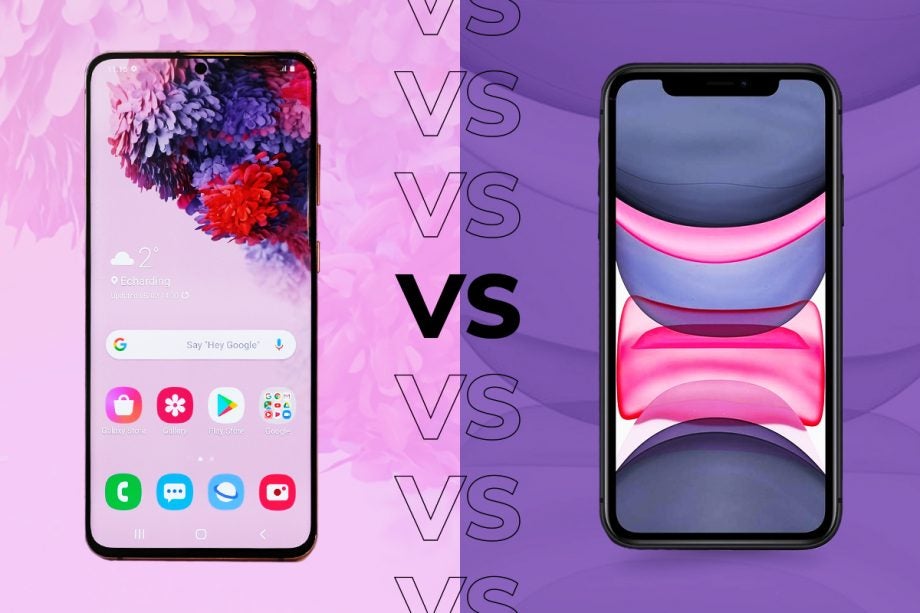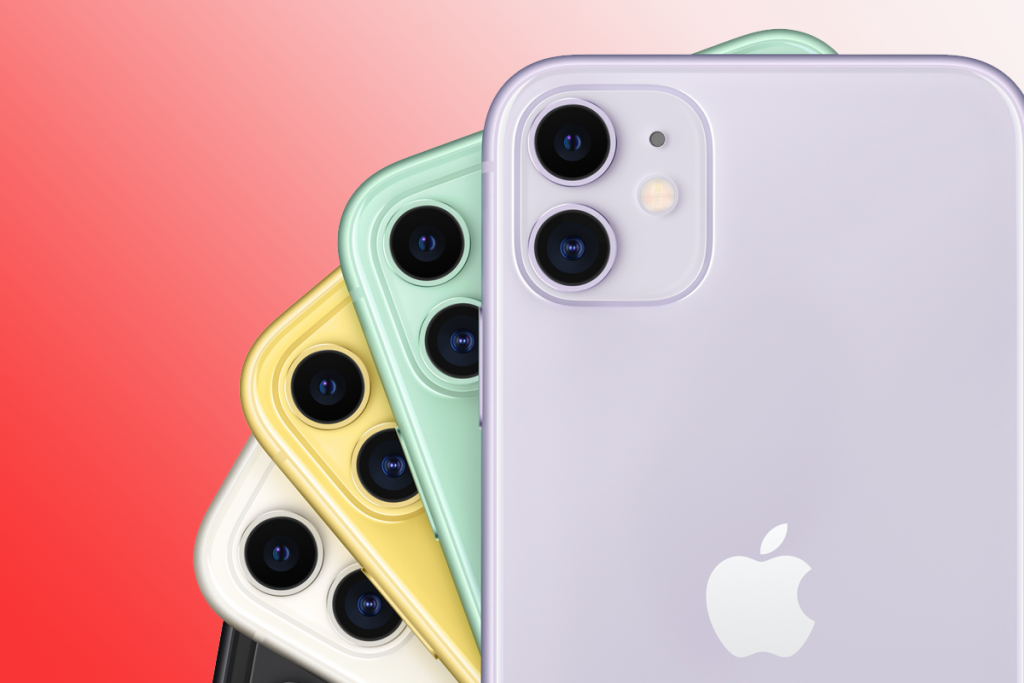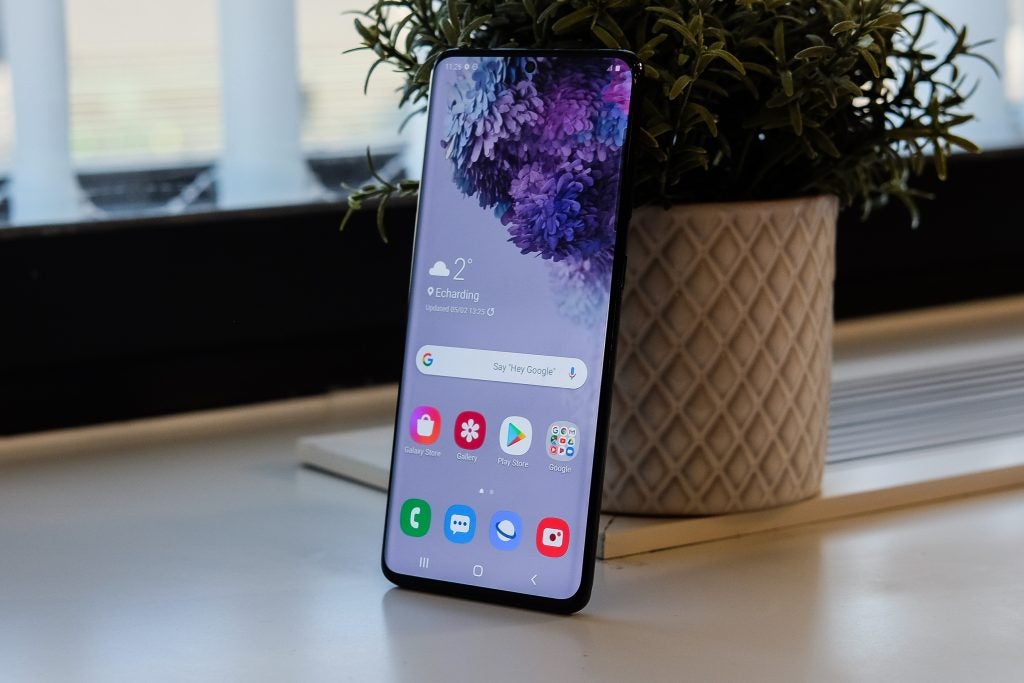Samsung Galaxy S20 vs iPhone 11: Should you go iOS or Android?

Samsung’s latest flagship phone series includes the Galaxy S20, S20 Plus and the S20 Ultra. The S20 is the most affordable, but how does it stand up to Apple’s cheapest new iPhone?
Both the Samsung Galaxy S20 and the iPhone 11 will likely be two of the most popular and best-selling phones of the year.
Deciding which one is for you could be tricky considering all the differences between them, so we’re here to lay everything out.
Samsung Galaxy S20 vs iPhone 11 – At a glance
- The Samsung Galaxy S20 and the iPhone 11 are the most affordable new flagships from their respective brands
- The Samsung Galaxy S20 has a 6.2-inch AMOLED display. The iPhone 11 has a 6.1-inch LCD display.
- The Samsung Galaxy S20 is powered by the Exynos 990 7nm 64-bit octa-core processor, while the iPhone 11 is powered by Apple’s A13 chipset, a 7nm 64-bit hexa-core processor.
- The Samsung Galaxy S20 has three rear cameras (an ultra wide, wide-angle and a telephoto), while the iPhone 11 has two (an ultra wide and a wide-angle).
- The Samsung Galaxy S20 supports 5G, while the iPhone 11 doesn’t.
Samsung Galaxy S20 vs iPhone 11 – Specs and Camera
The iPhone 11 is powered by Apple’s A13 Bionic chipset, a 7nm 64-bit hexa-core processor, while the Galaxy S20 is fitted with the Exynos 990 7nm 64-bit octa-core processor (in the US it uses Qualcomm’s 865 chip). As far as memory is concerned, the Galaxy S20 comes in 8GB and 12GB RAM options, while the iPhone 11 just has 4GB RAM. iPhones have long packed less RAM than their Android counterparts, and remain just as smooth when it comes to multitasking.
Despite that, Apple trumps Samsung for built-in storage. The Galaxy S20 comes with 128GB storage, while the iPhone 11 has 64GB, 128GB and 256GB models. That said, the S20 is expandable with a MicroSD slot that’s compatible with up to 1TB of additional data. Of course, this comes at an additional cost, but adds a degree of flexibility for avid videographers and users who like to download and watch movies on-the-go.
The Samsung Galaxy S20 features a triple rear camera, while the iPhone 11 only has a double.
The iPhone 11’s camera includes a wide angle (12MP, F1.8, OIS) and an ultra wide sensor (12MP, F 2.4); while the S20 is has a wide angle sensor (12MP, F1.8, OIS), an ultra-wide sensor (12MP, F2.2) and the added perk of a telephoto lens (64MP, F2.0, OIS).
All the cameras on these phones are great, and they’re easily some of the best camera phones on the market. Snaps from the S20 tend to have richer colours, while the iPhone’s pictures have more of a natural finish. Of course, having that extra zoom lens does give the S20 more versatility.
They’re also two of the best phones you can buy right now for video. The iPhone 11 shoots well stabilised footage with lovely colours, while the S20 ups the resolution to 8K and gives you a bit more control.
The front cameras are similar in terms of specs, with Apple packing a few more megapixels into its sensor. The S20 comes with a 10MP, F2.2 selfie camera, while the iPhone 11 has a 12MP, F2.2 TrueDepth camera.
Samsung was already ahead of Apple with 5G when it released the Galaxy S10 5G last year. Apple failed to follow up with a 5G iPhone 11 while Samsung has continued on this path. The S20 comes in both 5G and regular 4G versions, with a £100 price hike to get access to next-gen speeds.
Related: Best smartphones
Samsung Galaxy S20 vs iPhone 11 – Battery life and charging
The Galaxy S20 is packed with a 4000mAh battery and supports fast-charging up to 25W. In our time with the phone, we consistently managed to jump from 0 to 100% in an hour, which is very impressive.
Overall battery life isn’t as impressive, and you’ll have to manage your usage to comfortably make it through the day. A lot of that battery drainage comes from the S20’s excellent 120Hz OLED screen.
On the other hand the iPhone 11 offers better endurance, although that’s to be expected with a display that isn’t as exciting. The iPhone 11 can juice up to 50% capacity in 30 minutes with an 18W or above charger – though you’ll need to buy this separately, and the included 5w charger is far slower.
Both phones also support wireless charging, so they’re equally great options if you’re ready to ditch cables for good.
Samsung Galaxy S20 vs iPhone 11 – Look and feel
The Samsung Galaxy S20’s display is ever so slightly bigger than the iPhone 11 at 6.2-inches to the iPhone’s 6.1-inches. Even with the bigger screen, the Galaxy S20 is slender and lighter than its rival.

iPhone 11
When it comes to screen quality, the Samsung Galaxy S20 is the clear winner. Not only does the S20 use a superior OLED panel (compared to the iPhone 11’s LCD), but it has a higher resolution, HDR10+ support, and a fast 120Hz refresh rate. This means the S20’s display refreshes twice as much as the iPhone and is all the smoother for it.
If you want to take advantage of the S20’s standout 120Hz refresh rate, you’ll need to turn your display down to regular old FHD to avoid putting too much strain on the battery.

Samsung Galaxy S20
The iPhone 11 uses Apple’s TrueDepth camera to secure your phone with Face ID, while Samsung has included a fingerprint sensor hidden beneath the display, as well as facial recognition, to lock its latest flagship.
Samsung Galaxy S20 vs iPhone 11 – How much do they cost?
To just about everyone’s surprise, Apple has released the more affordable phone here.
You can pick up a 64GB iPhone 11 for just £729 – £70 less than the cheapest Galaxy S20. Of course this includes less storage than the S20, but the 128GB iPhone 11 is also less pricey than Samsung’s 128GB equivalent at £779 to the S20’s £799.
If you want a 256GB handset, you can pick up an iPhone 11 for £879. If your priority is 5G, the 5G S20 is priced at £889 with additional storage possible with an SD card.
Samsung Galaxy S20 vs iPhone 11 – Verdict
These are two great phones that boast very impressive performance, cameras and other features. They’re also the more affordable entries in each brand’s respective series. There are pricier, higher-specced options available, but we’d say these are the best picks.
The choice really comes down to what you want most in a phone: the Galaxy S20 wins in terms of display and 5G, however we prefer the software and camera on the iPhone 11. And let’s not get into the whole Android v iOS debate. We’ll be here for ages…


